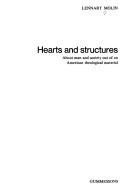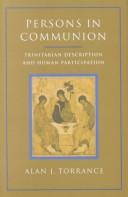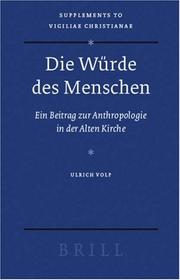| Listing 1 - 10 of 51 | << page >> |
Sort by
|
Book
ISBN: 9780674183070 Year: 2014 Publisher: Cambridge, MA : Harvard University Press,
Abstract | Keywords | Export | Availability | Bookmark
 Loading...
Loading...Choose an application
- Reference Manager
- EndNote
- RefWorks (Direct export to RefWorks)
Book
ISBN: 9567293066 9789567293063 Year: 1994 Publisher: Santiago: Comala,
Abstract | Keywords | Export | Availability | Bookmark
 Loading...
Loading...Choose an application
- Reference Manager
- EndNote
- RefWorks (Direct export to RefWorks)
Book
ISSN: 07638647 ISBN: 9782204081474 2204081477 Year: 2006 Volume: *18 Publisher: Paris: Cerf,
Abstract | Keywords | Export | Availability | Bookmark
 Loading...
Loading...Choose an application
- Reference Manager
- EndNote
- RefWorks (Direct export to RefWorks)
Theological anthropology --- Anthropologie théologique --- Christianity --- History of doctrines --- Christianisme --- Histoire des doctrines --- Christian theology --- Anthropologie théologique --- Theological anthropology - Christianity - History of doctrines - Early church, ca 30-600 --- Personne --- Patrologie
Book
ISBN: 9789042929166 9042929162 Year: 2013 Volume: 6 Publisher: Leuven: Peeters,
Abstract | Keywords | Export | Availability | Bookmark
 Loading...
Loading...Choose an application
- Reference Manager
- EndNote
- RefWorks (Direct export to RefWorks)
By any standard, Augustine of Hippo casts an imposing shadow. With a retrospective distance of 1600 years, his influence on Western thought, political structures, religious institutions, and selfhood seems obviously the work of a giant. However, this god-like figure did not burst forth full-grown. His prodigious creativity was both constrained and aided by a rich complex of theological and philosophical traditions. En route to the Confessions charts the development of Augustine’s various understandings of the human person by tracing his phased interactions with particular intellectual traditions and issues from his conversion until his composition of the Confessions. The correlated alterations to Augustine’s use of spiritual exercises for human development at each stage are also explored. Augustine’s anthropological thinking emerges therein as a series of strikingly fruitful yet thoroughly human syntheses of ancient philosophic and Christian thought. Augustine’s philosophical resources and strategical alliances turn out to be much broader than most scholarly accounts have acknowledged. In particular, Augustine made much more extensive use of Roman Stoic conceptualities and argumentative strategies in constructing his philosophical anthropology than heretofore considered.
Augustine --- Views on philosophical anthropology --- Philosophical anthropology --- Theological anthropology. --- Theological anthropology --- Christianity --- History of doctrines --- Augustine, --- Theological anthropology - Christianity - History of doctrines - Early church, ca 30-600. --- Augustine, - of Hippo, Saint, - 354-430

ISBN: 9170704872 9789170704871 Year: 1976 Publisher: [Falköping]: Gummessons,
Abstract | Keywords | Export | Availability | Bookmark
 Loading...
Loading...Choose an application
- Reference Manager
- EndNote
- RefWorks (Direct export to RefWorks)
Theological anthropology --- Christian sociology --- Christian ethics --- Christianity --- History of doctrines --- History --- History. --- Niebuhr, Reinhold, --- Niebuhr, H. Richard --- Gustafson, James M. --- Lehmann, Paul Louis, --- Niebuhr, H. Richard, --- Theological anthropology - Christianity - History of doctrines - 20th century --- Christian sociology - History --- Christian ethics - History
Book
ISBN: 0340128437 9780340128435 Year: 1970 Publisher: London: Hodder and Stoughton,
Abstract | Keywords | Export | Availability | Bookmark
 Loading...
Loading...Choose an application
- Reference Manager
- EndNote
- RefWorks (Direct export to RefWorks)
Theological anthropology --- Christianity --- History of doctrines --- Lewis, Clive Staples, --- Religion --- Lewis, C. S. --- Theological anthropology - Christianity - History of doctrines - 20th century --- Lewis, C. S. - (Clive Staples), - 1898-1963 - Religion --- Lewis, C. S. - (Clive Staples), - 1898-1963

ISBN: 0567097404 9780567097408 Year: 1996 Publisher: Edinburgh: T&T Clark International,
Abstract | Keywords | Export | Availability | Bookmark
 Loading...
Loading...Choose an application
- Reference Manager
- EndNote
- RefWorks (Direct export to RefWorks)
Trinity --- Theological anthropology --- History of doctrines --- Christianity --- Barth, Karl, --- 231.01 --- 231.01 Drieëenheid. Drievuldigheid --- Drieëenheid. Drievuldigheid --- Trinity - History of doctrines - 20th century --- Theological anthropology - Christianity - History of doctrines - 20th century --- Barth, Karl, - 1886-1968. - Kirchliche Dogmatik. - English
Book
ISSN: 15907449 ISBN: 9788872103517 8872103517 Year: 2006 Volume: 276 Publisher: Roma: Pontificio istituto orientale,
Abstract | Keywords | Export | Availability | Bookmark
 Loading...
Loading...Choose an application
- Reference Manager
- EndNote
- RefWorks (Direct export to RefWorks)
Theological anthropology --- Christianity --- History of doctrines --- 281.93 --- Orthodoxe Kerk van Rusland --- 281.93 Orthodoxe Kerk van Rusland --- Anthropology, Doctrinal --- Anthropology, Theological --- Body and soul (Theology) --- Doctrinal anthropology --- Humanity, Doctrine of --- Man, Doctrine of --- Man (Theology) --- Mankind, Doctrine of --- Religion --- Nesmelov, V. I. --- Несмелов, В. И. --- Niesmiełow, Wiktor Iwanowicz, --- Nesmelov, Viktor Ivanovich, --- Theological anthropology - Christianity - History of doctrines - 19th century --- Theological anthropology - Christianity - History of doctrines - 20th century

ISSN: 0920623X ISBN: 9004154485 9789004154483 9786611400880 1281400882 9047411277 9789047411277 Year: 2006 Volume: 81 Publisher: Leiden ; Boston : Brill,
Abstract | Keywords | Export | Availability | Bookmark
 Loading...
Loading...Choose an application
- Reference Manager
- EndNote
- RefWorks (Direct export to RefWorks)
There can be no doubt that there is a link between early Christian statements on human dignity and the corresponding modern concept, as it appears ever more frequently in current bioethical debates. This study attempts to throw light on the surprisingly complex process of the emergence of such a Christian concept of human dignity in antiquity and portrays it as a process governed by contradictions and antagonisms: between biblical and platonic anthropology; between a platonic and a stoic perception of humanity; between gnostic and antignostic cosmology; between biblically based criticism of human culture on the one hand and heilsgeschichtlichem cultural optimism on the other hand; between Greek and Roman thinking. This history of the idea of the “dignity of man” is being recounted taking into consideration the complex matrix of Christian theory and practice (including issues such as worship, contraception and abortion), piety and theological reflection, ethics, liturgy and theological as well as cutural anthropology. *** Bei dieser Studie handelt es sich um den Versuch einer zusammenfassenden Darstellung der christlich-antiken Auseinandersetzung mit der Würde des menschlichen Lebens Diese wird nicht nur gegenwärtig etwa in der Bioethik wieder kontrovers diskutiert, sondern ist auch in der Antike ein Feld philosophischer und theologischer Überlegungen gewesen. Volp fragt, inwieweit sich in den Schriften der antiken christlichen Denker die Vorstellung einer mit einer besonderen Würde ausgestatteten gemein-menschlichen Natur findet, die Menschen von Tieren und von belebter und unbelebter Materie unterscheidet, und wie diese Natur gefaßt und begründet wird. Ausgehend von der These, daß diese Überlegungen nicht nur Auswirkungen auf die ethische und religiöse Praxis der Alten Kirche hatten, sondern umgekehrt auch entscheidend von ihr geprägt wurden, konzentriert sich die Arbeit nicht nur auf die theoretischen Äußerungen der Kirchenväter, sondern bezieht ethische Konkretionen (Schwangerschaftsabbruch, Umgang mit Menschen mit Behinderungen, Krieg) und den christlichen Kult mit in die Untersuchung ein. Zum Vorschein kommt ein überraschend komplexes Bild einer alles andere als selbstverständlichen geistesgeschichtlichen Entwicklung, deren Folgen bis in die heutige Zeit nachwirken.
Theological anthropology --- Dignity --- Christianity --- History of doctrines --- Religious aspects --- 233 --- De mens. Theologische antropologie --- Human dignity --- Values --- Man (Theology) --- Primitive and early church, ca. 30-600 A.D. --- Theological anthropology - Christianity - History of doctrines - Early church, ca 30-600. --- Dignity - Religious aspects - Christianity - History of doctrines - Early church, ca. 30-600.
Book
ISBN: 0820422894 9780820422893 Year: 1994 Volume: 7 Publisher: New York (N.Y.): Lang,
Abstract | Keywords | Export | Availability | Bookmark
 Loading...
Loading...Choose an application
- Reference Manager
- EndNote
- RefWorks (Direct export to RefWorks)
Girard, Rene --- Theological anthropology --- Ethnology --- Christianity --- History of doctrines --- Religious aspects --- Girard, René, --- Cultural anthropology --- Ethnography --- Races of man --- Social anthropology --- Anthropology --- Human beings --- Girard, René, --- Theological anthropology - Christianity - History of doctrines - 20th century --- Ethnology - Religious aspects - Christianity - History of doctrines - 20th century --- Girard, René, - 1923-2015 --- GIRARD (RENE), ESSAYISTE ET ANTHROPOLOGUE FRANCAIS, 1923 --- -SCIENCES HUMAINES --- VIE INTELLECTUELLE --- FRANCE --- DISCOURS, ESSAIS, CONFERENCES --- Vie intellectuelle
| Listing 1 - 10 of 51 | << page >> |
Sort by
|

 Search
Search Feedback
Feedback About UniCat
About UniCat  Help
Help News
News